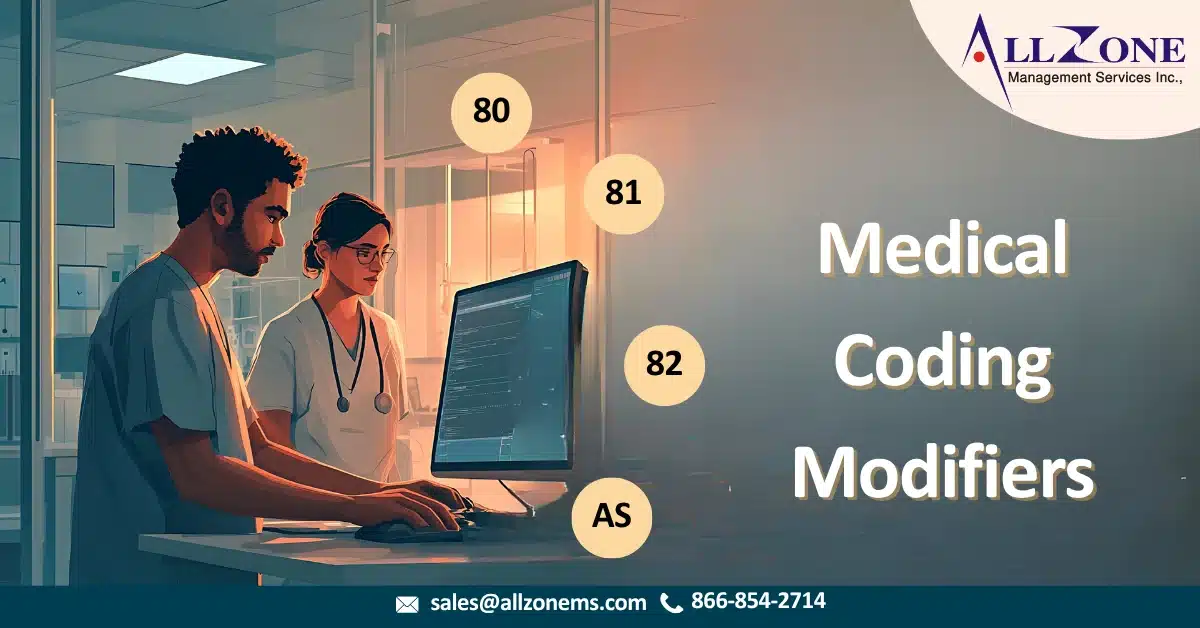Medical billing and coding is a critical part of healthcare revenue cycle management (RCM), ensuring providers are reimbursed accurately for their services. Among the many modifiers used in coding, Modifiers 80, 81, 82, and AS are essential in defining the role of assistant surgeons during procedures. Correct usage of these modifiers can prevent claim denials, improve reimbursement, and maintain compliance with payer policies.
In this blog, we will provide a comprehensive guide on Modifiers 80, 81, 82, and AS, including their descriptions, examples, and usage guidelines.
What Are Assistant Surgeon Modifiers?
Assistant surgeon modifiers indicate that a secondary surgeon assisted the primary surgeon during a procedure. These modifiers help payers determine if additional reimbursement is appropriate and clarify the extent of the assistant surgeon’s involvement.
Here are the most commonly used assistant surgeon modifiers:
- Modifier 80: Assistant Surgeon – fully involved in assisting the primary surgeon.
- Modifier 81: Minimum Assistant Surgeon – performed only a minor portion of the surgery.
- Modifier 82: Assistant Surgeon (Unqualified Resident) – when an assistant is required but a qualified resident is unavailable.
- Modifier AS: Assistant Surgeon for Medicare cases – identifies a qualified assistant surgeon when Medicare rules apply.
Modifier 80 – Assistant Surgeon
Description:
Modifier 80 is used when a qualified assistant surgeon participates fully in a surgical procedure. This typically applies when the assistant is necessary to help the primary surgeon complete the operation efficiently and safely.
Usage Guidelines:
- Use only when a qualified assistant surgeon is involved.
- Do not use if the assistant’s contribution is minor (use Modifier 81 instead).
- Ensure documentation in the patient record confirms the assistant’s role.
Example:
- Procedure: Appendectomy (CPT 44950)
- Coding: 44950-80
Reimbursement Note:
Modifiers 80 claims may receive reduced reimbursement, usually around 16–20% of the primary surgeon’s fee, depending on payer policies.
Modifier 81 – Minimum Assistant Surgeon
Description:
Modifier 81 indicates that an assistant surgeon’s role was limited to a minor portion of the procedure. This modifier is used when full assistance was not necessary.
Usage Guidelines:
- Use when the assistant performs only minor parts of the surgery.
- Documentation must specify the limited role of the assistant surgeon.
- Commonly used in minor surgical procedures where partial assistance is adequate.
Example:
- Procedure: Hernia repair (CPT 49505)
- Coding: 49505-81
Reimbursement Note:
Payment for Modifier 81 is usually lower than Modifier 80, reflecting the limited involvement of the assistant surgeon.
Modifier 82 – Assistant Surgeon (Unqualified Resident)
Description:
Modifier 82 is used when an assistant surgeon is required, but a qualified resident is not available to perform the task. This allows for reimbursement when an unqualified assistant surgeon must assist the primary surgeon.
Usage Guidelines:
- Use only when a teaching hospital requires an assistant surgeon.
- The modifier must indicate that the resident was unavailable.
- Documentation must clearly justify the use of an unqualified assistant.
Example:
- Procedure: Open cholecystectomy (CPT 47600)
- Coding: 47600-82
Reimbursement Note:
Payers generally reimburse for Modifier 82 at rates similar to Modifier 80, provided documentation supports the necessity of an unqualified assistant.
Modifier AS – Assistant Surgeon for Medicare
Description:
Modifier AS is specific to Medicare patients and identifies the presence of a qualified assistant surgeon in the surgical procedure. It aligns with Medicare’s payment policies regarding assistant surgeon reimbursement.
Usage Guidelines:
- Use only for Medicare-covered procedures requiring an assistant.
- Ensure the assistant surgeon meets Medicare’s qualifications.
- Proper documentation in the operative report is mandatory.
Example:
- Procedure: Total hip replacement (CPT 27130)
- Coding: 27130-AS
Reimbursement Note:
Medicare typically reimburses assistant surgeons at 16% of the primary surgeon’s allowable fee when Modifier AS is used.
Key Documentation Requirements for Assistant Surgeon Modifiers
Proper documentation is critical to justify the use of assistant surgeon modifiers and avoid claim denials. Ensure the operative report includes:
- Name of the assistant surgeon.
- Specific parts of the surgery performed by the assistant.
- Justification for requiring an assistant surgeon.
- Time spent assisting (if applicable).
Common Errors to Avoid
- Incorrect Modifier Selection: Using Modifier 80 when the assistant only played a minor role.
- Incomplete Documentation: Failing to document the assistant’s role may lead to claim denial.
- Non-Medicare Cases: Using Modifier AS for non-Medicare patients can result in improper billing.
- Redundant Coding: Avoid attaching multiple assistant surgeon modifiers to the same procedure unless justified.
Tips for Accurate Modifier Use
- Review payer-specific policies, as reimbursement rules vary.
- Ensure coding staff are trained in differentiating between full and minimal assistance.
- Regularly audit surgical claims to check modifier accuracy.
- Maintain clear communication between surgeons and coders for accurate reporting.
Conclusion:
Understanding Modifiers 80, 81, 82, and AS is crucial for accurate surgical billing and maximizing reimbursement. Correct use of these modifiers, along with proper documentation, prevents claim denials, supports compliance with payer rules, and ensures that assistant surgeons are compensated appropriately.
By following the examples and guidelines outlined above, healthcare providers and medical billing professionals can confidently navigate assistant surgeon billing, reduce errors, and maintain a streamlined revenue cycle.

